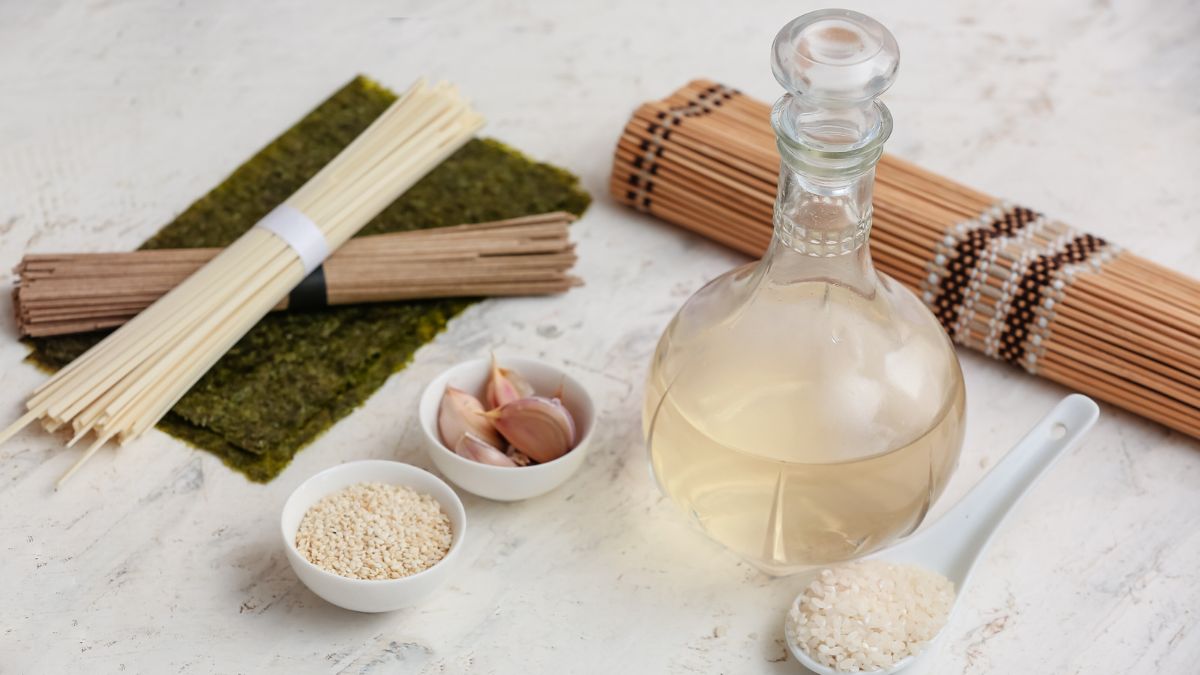Does Rice Vinegar Need to Be Refrigerated? Storing Tips


Rice vinegar is simple savory vinegar made of rice, and it is no different than regular vinegar, such as alcoholic or balsamic vinegar. That means rice vinegar storage is nearly the same as any other vinegar you have at home. So does rice vinegar need to be refrigerated?
Rice vinegar does not need to be refrigerated but it has to be stored well in cool, dry, and dark areas. Opened or unopened, it should be away from sunlight and warm temperatures. Although rice vinegar has a very long shelf-life, that period can be considerably shortened due to improper storage.
A staple product in Asian cuisine, rice vinegar is known as very durable and exceptionally safe to eat. Its high acidity makes it virtually impossible for bacteria to grow inside. However, it does go bad if you don’t handle it right. Therefore, in the following paragraphs, I will give you some valuable tips and instructions on properly storing rice vinegar.
How to Store Rice Vinegar?
Even though white vinegar can last for years without moving an inch, it doesn’t mean that it doesn’t have specific storage requirements. Storing it wrong could significantly shorten its shelf life, which would be a shame since rice vinegar is a great addition to food and an excellent preservative.
Storing an unopened bottle of rice vinegar is a piece of cake. It does excellent at room temperature, and its only requirement is to be stored away from light. The light penetrating the bottle could trigger a chemical reaction inside, decreasing the rice vinegar’s resilience, thus starting the spoiling process.
Still, even then, this process takes time to develop, so although direct light exposure poses a risk, it is still minimal.
Moreover, rice vinegar is highly acidic, making it almost impossible for bacteria to grow and change. Therefore, even if you are a little careless in storing it, chances are, it will be ok.
An opened bottle of rice vinegar is a little more fragile and thus more demanding than an unopened one. You need to store your opened bottle of rice vinegar in the pantry or in a safe kitchen cabinet. It absolutely needs to stay out of the light and be at a constant chilly temperature.
If you can’t give your opened bottle of rice vinegar the temperature it needs, a little below room temperature, you should place it in a cellar, the balcony (if the weather allows you), or cover it with a cotton towel to protect it.
Some people prefer to refrigerate opened rice vinegar, but I wouldn’t go that far, as the cold air may thicken its consistency. When the consistency thickens, you need to thin it to use it. This thickening and thinning of the consistency may cause a counterproductive result, triggering the spoiling process.
How Long Does Rice Vinegar Last?
When properly stored, an unopened bottle of rice vinegar can last at best quality for two years, and it will be safe indefinitely. However, the fact that your rice vinegar bottle can last you forever doesn’t mean you should use it after two years.
The quality will diminish, and it will no longer be able to do a proper job.
Once you open your rice vinegar bottle, you should adhere to the “best before” date as an orientation. You can still use your rice vinegar after this date, but not long after and cautiously. If you leave your opened rice vinegar exposed to sunlight, it will start oxygenizing and spoiling altogether.
How Do You Know If Rice Vinegar Is Bad?
Although it is far-fetched, rice vinegar could spoil. Luckily, it shows clear spoilage signs, and you can avoid unnecessary risks. The first sign of spoilage is the change of color.
Rice vinegar’s color is somewhat of an eggshell shade. It isn’t white, but it isn’t translucent, either. It is similar to the color of rice water.
If the spoilage process has taken over, the color will change from eggshell to yellowish. Since rice vinegar spoils slowly, even the slightest change in color means that the process has been going on for a while.
Another sign is consistency. If the rice vinegar has gone bad, you will probably notice that the liquid is getting blurry with solids floating inside.
The smell is also a sign. Typically, rice vinegar has an acidic but pleasant aroma. It should be aromatic but not stinky, so if the smell is unpleasant and gives off a rotten vibe, it means that the rice vinegar has gone bad.
Lastly, the taste. Rice vinegar has a sour and tart taste. Not everybody likes it, but it isn’t an unpleasant sensation.
If the rice vinegar has gone bad, it will have an expressively unpleasant flavor that you can recognize as spoiled.
How Long Does Rice Vinegar Last After Expiration Date?
Rice vinegar has a very long shelf life. If you haven’t opened it, you can keep it indefinitely. If you open it, you can use it for a minimum of one year after the expiration date. It won’t have the quality, but it will be safe.
What Are Good Rice Vinegar Substitutes?
Since rice vinegar is no different than other kinds of vinegar, such as apple cider, lemon, balsamic, or wine vinegar, you can use any of these as a substitute. Of course, depending on which substitute you use, your dish will taste differently, but it won’t be ruined or significantly altered.
